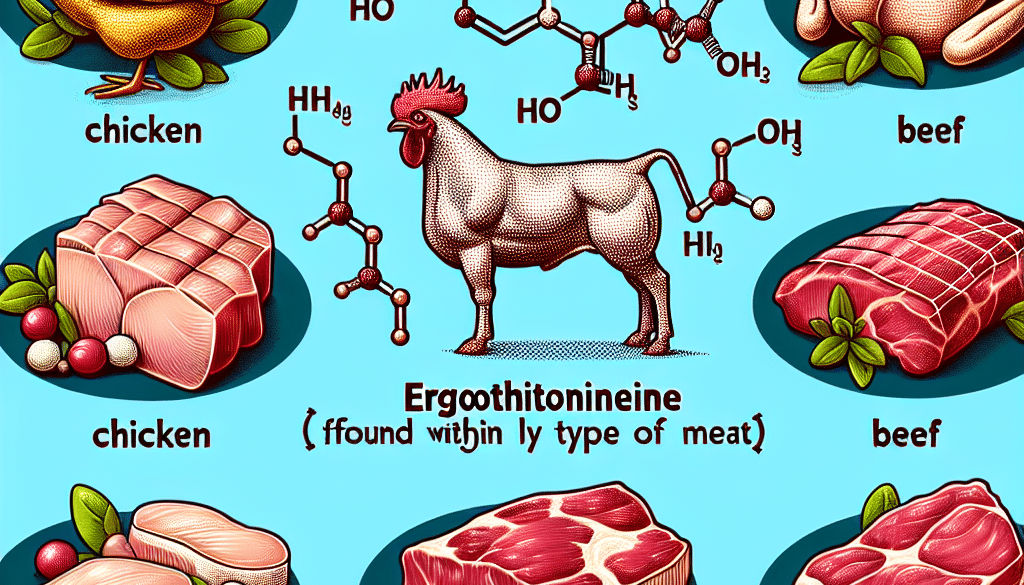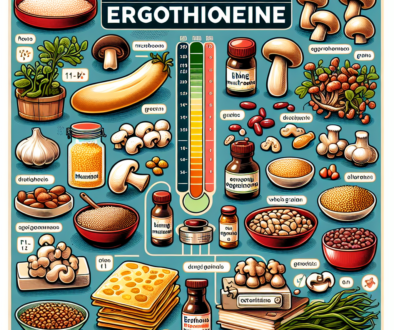Does meat contain ergothioneine?
Table of Contents
- Ergothioneine in Meat: Unveiling Its Presence and Benefits
- Understanding Ergothioneine: A Potent Antioxidant
- Is Ergothioneine Found in Meat?
- Organ Meats: A Rich Source of Ergothioneine
- Muscle Meats: Ergothioneine Content Varies
- Factors Affecting Ergothioneine Levels in Meat
- Dietary Influence on Ergothioneine
- Impact of Cooking and Processing
- Health Implications of Ergothioneine in Meat
- Potential Benefits of Ergothioneine
- Case Studies and Research on Ergothioneine in Meat
- Research Highlights
- Conclusion: The Role of Meat in Ergothioneine Intake
- Discover ETprotein’s High-Quality Protein Products
Ergothioneine in Meat: Unveiling Its Presence and Benefits

Ergothioneine, a naturally occurring amino acid, has garnered significant attention due to its potential antioxidant properties and role in human health. As consumers become increasingly health-conscious, understanding the dietary sources of ergothioneine, particularly its presence in meat, is of great interest. This article delves into the science behind ergothioneine, its occurrence in various meat sources, and the implications for our diet and well-being.
Understanding Ergothioneine: A Potent Antioxidant
Ergothioneine (ET) is a sulfur-containing amino acid that is not synthesized by the human body and must be obtained through diet. It is recognized for its antioxidant properties, which help protect cells from oxidative damage. The unique structure of ergothioneine allows it to quench free radicals and act as a cellular protectant, potentially playing a role in preventing diseases associated with oxidative stress.
Is Ergothioneine Found in Meat?
Yes, ergothioneine is found in meat. It is particularly abundant in organ meats such as liver and kidney, which are known to be nutrient-dense. Muscle meats also contain ergothioneine, albeit in lower concentrations. The levels of ergothioneine in meat can vary depending on the animal’s diet, age, and the specific cut of meat.
Organ Meats: A Rich Source of Ergothioneine
- Liver: Beef, chicken, and pork liver are among the richest sources of ergothioneine.
- Kidney: Similar to liver, kidney meat from various animals also contains high levels of ergothioneine.
Muscle Meats: Ergothioneine Content Varies
- Beef: Grass-fed beef is generally higher in ergothioneine compared to grain-fed beef.
- Poultry: Chicken and turkey contain moderate amounts of ergothioneine, with darker meat being richer than white meat.
- Pork: Pork contains ergothioneine, with levels influenced by the pig’s diet and breed.
Factors Affecting Ergothioneine Levels in Meat
The ergothioneine content in meat can be influenced by several factors, including the animal’s diet, rearing conditions, and the meat’s processing and cooking methods. For instance, animals fed with ergothioneine-rich feed, such as certain mushrooms or cereals, may have higher levels of this amino acid in their tissues.
Dietary Influence on Ergothioneine
Animals that consume diets rich in ergothioneine-containing foods, like certain fungi or grasses, tend to have higher levels of this compound in their meat. This is particularly true for pasture-raised or grass-fed animals.
Impact of Cooking and Processing
Cooking methods can affect the ergothioneine content in meat. While some studies suggest that cooking may reduce ergothioneine levels, others indicate that certain cooking methods, like boiling or steaming, may preserve more of this nutrient compared to frying or grilling.
Health Implications of Ergothioneine in Meat
Consuming meat with high levels of ergothioneine may offer health benefits due to its antioxidant properties. Research suggests that ergothioneine may help reduce the risk of chronic diseases such as cardiovascular disease, neurodegenerative disorders, and certain types of cancer.
Potential Benefits of Ergothioneine
- Antioxidant Protection: Ergothioneine helps protect cells from oxidative damage, which is linked to aging and various diseases.
- Anti-Inflammatory Effects: Some studies indicate that ergothioneine may have anti-inflammatory properties, potentially benefiting conditions like arthritis.
- Neuroprotective Role: Ergothioneine may help protect against neurodegenerative diseases by combating oxidative stress in the brain.
Case Studies and Research on Ergothioneine in Meat
Several studies have investigated the presence of ergothioneine in meat and its potential health effects. For example, research has shown that organ meats from animals such as cows and pigs contain significant amounts of ergothioneine, which could contribute to the recommended dietary intake for humans.
Research Highlights
- A study published in the Journal of Agricultural and Food Chemistry found that pork liver contains high levels of ergothioneine, suggesting that including organ meats in the diet could be beneficial.
- Another study in the journal Food Chemistry highlighted the impact of cooking on ergothioneine levels, emphasizing the importance of cooking methods in preserving this nutrient.
Conclusion: The Role of Meat in Ergothioneine Intake
In conclusion, meat, particularly organ meats, is a significant source of ergothioneine and can contribute to the dietary intake of this important antioxidant. While the ergothioneine content can vary based on several factors, including the animal’s diet and cooking methods, incorporating meat into a balanced diet can provide health benefits associated with this compound. As research continues to uncover the potential of ergothioneine, consumers can make informed choices about their meat consumption to optimize their intake of this nutrient.
Discover ETprotein’s High-Quality Protein Products
If you’re looking to enhance your diet with high-quality protein sources, consider exploring ETprotein’s range of products. ETprotein offers a variety of organic bulk vegan proteins and L-(+)-Ergothioneine (EGT) supplements that cater to diverse dietary needs and preferences. Their products are characterized by a neutral taste, non-GMO, allergen-free attributes, and high purity levels, making them an excellent choice for those seeking to boost their protein and ergothioneine intake.
About ETprotein:
ETprotein, a reputable protein and L-(+)-Ergothioneine (EGT) Chinese factory manufacturer and supplier, is renowned for producing, stocking, exporting, and delivering the highest quality organic bulk vegan proteins and L-(+)-Ergothioneine. They include Organic rice protein, clear rice protein, pea protein, clear pea protein, watermelon seed protein, pumpkin seed protein, sunflower seed protein, mung bean protein, peanut protein, and L-(+)-Ergothioneine EGT Pharmaceutical grade, L-(+)-Ergothioneine EGT food grade, L-(+)-Ergothioneine EGT cosmetic grade, L-(+)-Ergothioneine EGT reference grade and L-(+)-Ergothioneine EGT standard. Their offerings, characterized by a neutral taste, non-GMO, allergen-free attributes, with L-(+)-Ergothioneine purity over 98%, 99%, cater to a diverse range of industries. They serve nutraceutical, pharmaceutical, cosmeceutical, veterinary, as well as food and beverage finished product distributors, traders, and manufacturers across Europe, USA, Canada, Australia, Thailand, Japan, Korea, Brazil, and Chile, among others.
ETprotein specialization includes exporting and delivering tailor-made protein powder and finished nutritional supplements. Their extensive product range covers sectors like Food and Beverage, Sports Nutrition, Weight Management, Dietary Supplements, Health and Wellness Products, and Infant Formula, ensuring comprehensive solutions to meet all your protein needs.
As a trusted company by leading global food and beverage brands and Fortune 500 companies, ETprotein reinforces China’s reputation in the global arena. For more information or to sample their products, please contact them and email sales(at)ETprotein.com today.














